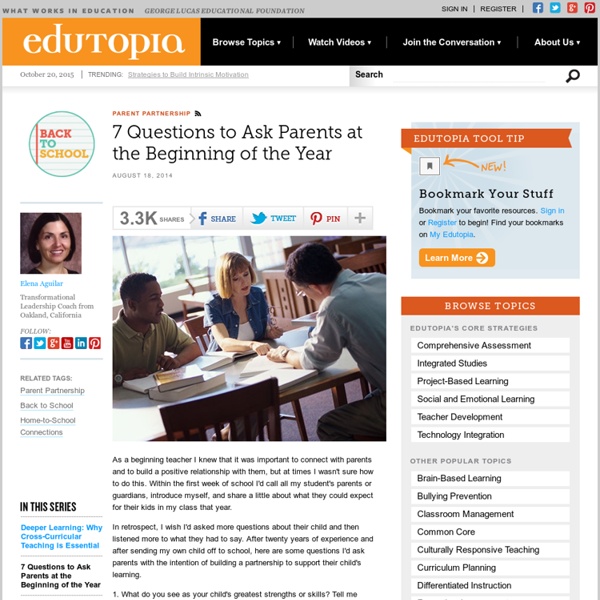7 Questions to Ask Parents at the Beginning of the Year

Common Core for Math
Preparing the Environment
5 Ways to Help Your Students Become Better Questioners
The humble question is an indispensable tool: the spade that helps us dig for truth, or the flashlight that illuminates surrounding darkness. Questioning helps us learn, explore the unknown, and adapt to change. That makes it a most precious “app” today, in a world where everything is changing and so much is unknown. To change that is easier said than done. How to Encourage Questioning 1. Asking a question can be a scary step into the void. 2. This is a tough one. 3. Part of the appeal of “questions-only” exercises is that there’s an element of play involved, as in: Can you turn that answer/statement into a question? 4. Obviously, we must praise and celebrate the questions that are asked -- and not only the on-target, penetrating ones, but also the more expansive, sometimes-offbeat ones (I found that seemingly “crazy questions” sometimes result in the biggest breakthroughs). 5. So ask yourself this beautiful question: How might I encourage more questioning in my classroom?
CCSS: High School
Handshake Q&A
Literature » Grade 7
Key Ideas and Details: CCSS.ELA-Literacy.RL.7.1Cite several pieces of textual evidence to support analysis of what the text says explicitly as well as inferences drawn from the text. CCSS.ELA-Literacy.RL.7.2Determine a theme or central idea of a text and analyze its development over the course of the text; provide an objective summary of the text. CCSS.ELA-Literacy.RL.7.3Analyze how particular elements of a story or drama interact (e.g., how setting shapes the characters or plot). Craft and Structure: CCSS.ELA-Literacy.RL.7.4Determine the meaning of words and phrases as they are used in a text, including figurative and connotative meanings; analyze the impact of rhymes and other repetitions of sounds (e.g., alliteration) on a specific verse or stanza of a poem or section of a story or drama. CCSS.ELA-Literacy.RL.7.5Analyze how a drama's or poem's form or structure (e.g., soliloquy, sonnet) contributes to its meaning Integration of Knowledge and Ideas:
Monica Sanfilippo: Contenuti
La Grande guerra secondo la metodologia della Flipped Classroom Introduzione metodologicaStudiare storia a scuola per molti ragazzi viene spesso vissuto come un'attività noiosa e lontana dalla vita reale. Gli avvenimenti del passato sembrano lontani e a volte inutili, con tante date da ricordare, avvenimenti, persone, luoghi mai sentiti. A differenza di quello che molti pensano, invece, la storia è una materia viva che può essere insegnata e studiata anche fuori dai banchi di scuola, con finalità inaspettate. OBIETTIVIProporre la Grande guerra secondo la prospettiva della Flipped Classroom, apre nuove possibilità di apprendimento con l'obiettivo primario di superare il meccanismo standardizzato di una semplice trasmissione nozionistica dei fatti per sperimentare un rinnovato entusiasmo attraverso la costruzione dei saperi. Le risorse di riferimento per le esercitazioni sono contenute nella pagina dedicata di questo blog RISORSE DAL WEB2MAPPE CONCETTUALI
Sign Language
Photos du journal - Unimondo Face2Facebook
Behavior Expectations
MDM for Dummies. Quando il prof. controlla gli iPad in classe | Classi 2.0
Maurizio Nano è tecnico certificato Apple e Analista Tecnico e Project Manager presso Rekordata, al suo attivo conta centinaia di grandi progetti di implementazione di strumenti mobili e fissi in grandi istituzioni. Contatti qui. Quello che vedi non è quello che fa funzionare il servizio E’ chiaro per tutti ormai che sia possibile sapere dove ci si trova, sapere dove dirigersi per andare al nostro appuntamento fissato in un luogo a noi sconosciuto senza dover fare richieste ai passanti come quelle che il caro Totò era obbligato a fare in una sua famosa “gag”; ma non è chiaro a tutti come sia possibile tutto ciò. La tecnologia è entrata ormai in modo importante nel mondo della didattica e molte delle cose che si possono fare sono note ai più ma poche volte si ragiona in modo analitico sul come fare perchè “tutto funzioni”. Questo è proprio il caso degli MDM, acronimo di Mobile Device Management. Un esempio concreto Store personalizzato Il docente in classe
ISTE One-Stop for CCSS
cecchinato.pdf
Using a "Fishbowl" for Discussions
Related:



